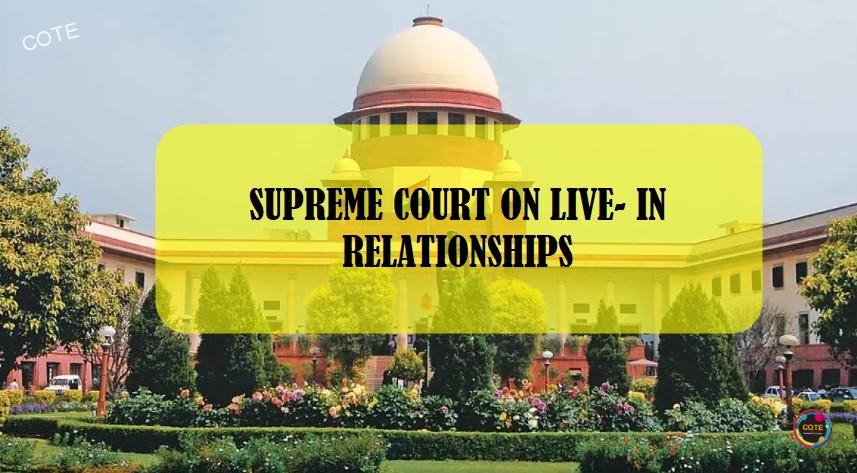Live-in relationships are legal in India but are they safe?
Through their decisions, the courts have legalised live-in partnerships, and a jurisprudence on the matter has emerged through time. However, there are some unanswered questions that merit more consideration. In the absence of expressly stated laws and provisions, courts rely significantly on precedents and interpretations of existing laws to resolve matters before them.
There is no particular statute governing live-in partnerships, but the Indian judiciary has established jurisprudence through a succession of decisions over the years. According to the Supreme Court’s decision in Badri Prasad vs. Dy.
Consolidation Director (1978) Live-in relationships are allowed in India, however there are several restrictions, such as marriage age, consent, and mental health.
The legality – or legitimacy – of live-in relationships was very easy for the courts to resolve because fundamental freedoms are generally elastic and have been extensively interpreted by judges.
However, some rules pertaining to live-in partnerships remain too inflexible for the courts to extend or interpret for the benefit of live-in partners.
The legality of a live-in relationship arises from Articles 19(a) of the Indian Constitution, which protects the right to free speech and expression, and Article 21 of the Indian Constitution, which protects the right to life and personal liberty.
“The right to life emphasises an individual’s freedom to enjoy life in any way unless it is restricted by existing laws.” It is a free society, and anyone can live wherever they want. In the context of live-in partnerships, Article 21’s Right to Life applies in the sense that an individual has the right to live with a person of their choice, with or without marriage “According to Outlook, Advocate Debrup Bhattacharyya, who practises at the Calcutta High Court.
Legalization of live-in relationships by a court of law
The legality of live-in partnerships dates back to the 1970s.
In Badri Prasad vs Board of Consolidators, the Supreme Court declared in 1978 that a presumption of marriage exists when a man and a woman have lived as husband and wife for a long time.
“A strong presumption emerges in favour of wedlock where the spouses have lived together as husband and wife for a long time.” Although the presumption is rebuttable, the person who wants to strip the relationship of its legal origin bears a hard burden “The Supreme Court ruled.
In Payal Sharma vs Nari Niketan, the Allahabad High Court held in 2001 that it is not illegal for a man and a woman to live together. The HC also distinguished between law and morality.
“As a result, she is a major [adult] with the right to go anywhere and live with whomever.” In our opinion, a man and a woman can live together even if they are not married. Although this is regarded immoral by society, it is not criminal “The HC stated.
In Lata Singh vs. State of UP, the Supreme Court held in 2006 that two people of opposite sex living together are not breaking any laws. The Supreme Court ruled in S. Khushboo vs Kanniammal & Others in 2010.
Reiterated the 2006 decision, noting that “a live-in relationship between two consenting adults of heterogenic sex does not constitute any offence (with the obvious exception of ‘adultery,’ even if it may be seen as immoral.”
The adultery exception is also no longer applicable, as the Supreme Court decriminalised adultery in Joseph Shine vs Union of India in 2018.
In Indra Sarma versus VKV Sarma, the Supreme Court declared in 2013 that the woman partner in a live-in relationship is protected under the Protection of Women from Domestic Violence (PWDV) Act, 2005.
Partners’ rights in live-in relationships
The Supreme Court determined in 2013 that women are protected by the PWDV Act, 2005 since live-in partnerships are defined as domestic connections under Section 2(f) of the law.
Domestic relationship is defined as “relationship between two persons who live or have lived together in a shared household at any point in time, when they are related by consanguinity, marriage, or a relationship in the nature of marriage, adoption, or are family members living together as a joint family.”
The Supreme Court found that live-in relationships come under the sub-definition section’s of “a connection in the form of marriage.”
In the lack of any explicit rule on the matter, the Supreme Court in Velusamy vs D Patchaimal in 2010 put down requirements for legal live-in partnerships, which is the closest to ‘codification’ of the question of live-in relationships.
The Supreme Court established the following standards:
- The couple must present themselves to society as spouses.
- To marry, they must be of legal age.
- They must be otherwise qualified, including being unmarried, to enter into a legal marriage.
- They must have freely cohabited and presented themselves to the world as spouses for an extended length of time.
As a result, certain live-in partnerships between two married people or one married person and another unmarried person have no legal standing.
According to the 2016 Punjab High Court decision in Ajay Bhardwaj vs Jyotsana, women are also eligible for alimony in live-in partnerships.
“Initially, Section 125 of the Code of Criminal Procedure (CrPC) only enabled a married woman who is unable to pay for herself to claim alimony from the husband,” says Advocate Bhattacharya. However, the Malimath Committee report today expanded the definition of ‘wife’ to include a woman who has lived with a man for a significant amount of time and is thus legally eligible to claim maintenance.”
Children from live-in relationships
In Kattukandi Edathil Krishnan & Others against Kattukandi Edathil Valsan & Others, the Supreme Court declared in June 2022 that children born to partners in live-in relationships can be regarded genuine. This is conditional in the sense that the relationship must be long-term and not of the ‘walk in, walk out’ variety.
“A long period of living together between a male and female raises a presumption of marriage between them, and the children born in such relationship are deemed legitimate children,” the Supreme Court said.
This gives such children property rights as well. According to the Supreme Court, “the law presumes in favour of marriage and against concubinage.” If a man and woman have lived together for a long time and have a kid, the child cannot be denied participation in the ancestral estates.
The Supreme Court has also declared that such children are eligible to inherit from their parents.
“The Supreme Court has declared that a child born out of an illicit marriage or a live-in relationship is a genuine child,” Bhattacharya tells Outlook. Furthermore, they have coparcenary rights on their ancestral holdings.”
Coparcenary powers are derived from the legal treatise known as ‘Mitakshara’ under the Hindu Succession Legislation, 1956, and the other existing treatise under the same act is known as ‘Dayabhanga.’ In terms of the nature of succession of ancestral properties, these two differ.
“Hindu inheritance rules are separated into two schools — Mitakshara and Dayabhaga,” Bhattacharyya explains. Dayabhaga refers to Hindus in Bengal and Assam, whereas Mitakshara refers to the rest of India. The concept of coparcenary right is derived from the Mitakshara school of thought, according to which a child by birth acquires automatic ownership on ancestral property even during the father’s lifetime, whereas in the case of Dayabhanga, the question of ownership arises only after the father’s death.”
However, Indian law has yet to recognise the property inheritance rights of two partners in a live-in relationship. As of today, it is prohibited since live-in partners do not qualify as Class-1 or Class-2 heirs under the Hindu Succession Act of 1956.
Unanswered questions about same-sex live-in relationships
When it comes to same-sex relationships, the court opinions are conflicting.
The qualifications given by the Supreme Court in the 2010 Velusamy Vs D Patchaimal decision contained the following point: they [live-in partners] must be otherwise competent to engage into a lawful marriage, even being unmarried.
Because same-sex marriages are illegal in India, same-sex live-in relationships should be illegal as well, but the Odisha High Court determined in 2020 that same-sex partnerships are permissible.
“As a result, we grant the writ application (criminal) and direct that the petitioner and the daughter of the Opposite Party No.5 have the right to decide their sexual preferences, including the right to remain as live-in partners,” the Supreme Court said in a case involving two females who wanted to stay together.

“There is hardly any scope to take a view other than holding that the petitioner has the right of self-determination of sex/gender and also he has the right to have a live-in relationship with a person of his choice even though such person may belong to the same gender as the petitioner,” the HC said, in favour of gender self-identification.
Beyond this case, however, the legality of same-sex live-in relationships is likely to be murky, since a Supreme Court judgement contradicts itself.
There are still unanswered concerns, such as how to protect same-sex partners or men in heterosexual live-in relationships from intimate partner violence, particularly sexual violence. The Indian Penal Code (IPC) Section 375 defines rape as an offence committed by a man against a woman, hence a man in a heterosexual or a woman in a same-sex live-in relationship has no remedy if they are violated.
Furthermore, there is no provision for alimony for men, and the Supreme Court has controversially determined that only men initiate live-in partnerships.
“Men in live-in relationships are not eligible for relief under the PWDV Act of 2005.” In this regard, it is worth noting that the Court stated in the case of Khushboo vs Kanniamal that “a live-in relationship is invariably initiated and perpetuated by men,” write the authors of the paper Live-In Relationships in India- Legal and Psychological Implications in Journal of Psychosexual Health.
Furthermore, because India has personal laws based on religion, the concerns of succession and children’s legitimacy discussed thus far have exclusively concerned Hindu family laws or the Special Marriage Act.
There is no clarification on whether similar privileges apply to other religions, such as Muslims or Christians, with two experts telling Outlook that alimony or the validity of children born out of live-in partnerships is not acceptable under Muslim personal law.
According to Iqbal Ali Khan, Professor, Faculty of Law, Aligarh Muslim University, live-in relationships with pre-marital sex as an essential component involve zina, which is not acceptable in Islamic law (AMU). In Islamic law, zina refers to premarital sex.
“Live-in relationships are nowhere mentioned in Muslim laws, and they are not mentioned even in Hindu laws,” says Waheed Alam, Assistant Professor, Faculty of Law, Shia PG College, Lucknow. “However, the courts have legalised it for Hindus, even giving property rights to children born in such relationships.”
According to Alam, current court judgements on live-in partnerships do not apply to Muslim personal law, therefore children of Muslim live-in partners would be considered illegitimate under current law.
“Since there is nothing written as legislation on this subject, the courts are interpreting existing rules on their own,” Alam explains to Outlook. There is a need for legislation on the subject so that there is clarity and that courts do not issue contradictory judgements.”

| Social Media Links:- | #CONTENTONTHEEDGE – C.O.T.E |
| Youtube- ✅ | Subscribe to the YouTube channel of Content on the Edge |
| Facebook- ✅ | Like and Follow on Facebook for Latest content videos of C.O.T.E |
| Instagram- ✅ | Follow on Instagram for Latest content |
| Twitter- ✅ | Join Content on the Edge on Twitter for latest updates |
| Telegram Channel- ✅ | Join Telegram Channel to get latest files and updates |
| Telegram Group- ✅ | Join C.O.T.E Telegram Group to get latest updates |
| Whatsapp- ✅ | Click to text C.O.T.E on Whatsapp |
| Whatsapp Channel- ✅ | Click to Join C.O.T.E Whatsapp Channel for Latest Updates |



